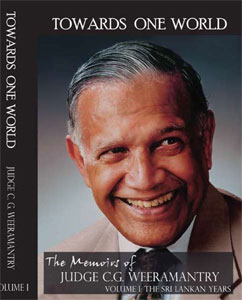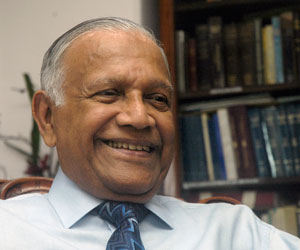Laughter echoes through the cluttered offices of WICPER (Weeramantry International Centre for Peace Education). Judge Christopher Gregory Weeramantry is its instigator. Surrounded by a sea of books and papers, he is sharing the story one of his grand-daughters wrote for him when she was seven.
Fittingly, it featured a ‘jaj’ named Weeramantry who was called upon to settle a dispute that was the source of great rancour between two fairies and which had then forced all fairies to take sides, dividing the community. Unfortunately, the solution offered by their judge proved unsatisfactory. The fairies then turned to Queen Rosemary Weeramantry and in the end, it was achchi’s solution that won the day. “And everyone lived happily ever after,” he concludes, clearly well pleased with this offering from a precocious grandchild.
It’s a side of this almost impossibly distinguished man that very few people see. After all, to the right of where he sits hangs a framed portrait in which a younger Judge Weeramantry presides over the 15 member World Court in full session at the magnificent Peace Palace in The Hague. It’s telling that even his years of service as a Supreme Court judge in Sri Lanka may be eclipsed in the wake of his other contributions to the field.
A revolutionary thinker, Judge Weeramantry has over the course of nearly 20 books and countless judgments, papers, studies and lectures found himself redefining the law’s role in relation to some of the most controversial issues of our age.
From the regulation of genetic science and the use of nuclear weapons, to the end of apartheid and the neglected contributions of Islamic jurisprudence and now to the underlying unity of all the world’s religions, Judge Weeramantry has voiced opinions that have shaped the policies not only of institutions like the United Nations and the World Court, but have informed the decisions made by the governments of entire countries.
Not least among these accomplishments is his role in the blossoming of a new approach to the formulation and implementation of international law – Judge Weeramantry is famous for challenging its old mono-cultural, westernized stance and campaigning to replace it with a more inclusive body of thought, informed by and based on a respect for the wisdom of all the world’s cultures.
His many accomplishments will make the launch of his memoirs ‘Towards One World’, quite the event. The first volume of five hundred pages on the Sri Lankan years will hit shelves later this week. The second volume – the international years – will follow within the next six months. But today, Judge Weeramantry is still dealing with hitches in the printing process. It is the eve of his 84th birthday and with laugh lines framing his face, the judge seems to take great pleasure in narrating some of the stories that find their way into the book. His voice is gravelly, the result of a mild attack of asthma that has kept him from a planned trip to Germany, but which he is determined will not prevent his trip to India next week.
“My work took such an unusual turn, because there were so many world problems that I got involved in,” he says looking back. We are discussing his visit to South Africa in the 1970s, where he served as a visiting professor at the Stellenbosch University for six weeks. “That was the height of apartheid and I laid down my terms and conditions, that I would be able to say what I wanted in the lecture room, meet who I wanted and go where ever I wanted.” To his surprise his terms were accepted. “I went deep down into the mines and met the African workers.
I went to the heart of apartheid, to the Supreme Court, where all the judges were... I saw apartheid even as few South Africans have seen it.” He predicted the coming end of the oppressive regime in a book titled ‘Apartheid: The Closing Phases?’ that was published in 1979. The book was promptly banned in South Africa, but a copy on microfilm was smuggled in inside a fountain pen and republished by the resistance movement.
These and other professional anecdotes find their way into the second volume of the memoirs, but the first is devoted entirely to his time in Sri Lanka. There’s even a baby picture that ran in a newspaper with the caption: ‘Christopher Weeramantry is the type that smiles his way through life, and a very good way too, Christopher.’ That smile is very much in evidence as he speaks of growing up with his brothers Lucien and Douglas and their cousin Osmond Jayaratne. His parents Gregory and Vivienne Weeramantry (née Dewapurarathne) created an environment where academic excellence was emphasised – “by my father more remotely, but by my mother more immediately,” he says, tongue in cheek.
 |
A mathematician, Gregory had topped the Cambridge University exams, coming first in the entire British Empire. His wife was a teacher who had herself been one of the few women to pass the same university exams. In fact, the family had more than its fair share of genius. Case in point, at the age of 15, Vivienne’s brother Bertram invented an improved reversing gear for the steam engine.
A few years later, then a student of engineering in England, he designed an improved version of the internal combustion engine for motor vehicles. He died mysteriously in the war, but not before royal patents were registered for both inventions. (Copies of these are included in the memoirs). “Imagine if only this poor boy had survived and come back to Sri Lanka, we might have had an industrial revolution here,” says Judge Weeramantry, “we would have been manufacturing motor cars of our own.”
In the company of aunts and uncles such as these, Christopher thrived. He remembers going for long walks with his father and that these jaunts served as a lesson in what his parent valued most.
Honest ministers encountered along the Galle Face walk were greeted with warmth and conversation, corrupt ones with a curt ‘good-evening’ and a cold shoulder. There were many visitors arriving at the house in Alexandra Place. G.G. Ponnambalam (the founder of the All Ceylon Tamil Congress) would canter up to visit Gregory and take Christopher for rides on his horse. Another frequent visitor was the influential lawyer and politician, Sir Razik Fareed, who had known Vivienne since kindergarten and shared a love of orchids with Gregory.
A notable incident: Peri Sundaram, another distinguished graduate of Cambridge and founder member of the Ceylon National Congress, had come to visit. “They were having a chat on the verandah, and then I saw him [Peri] stand up abruptly, as if he had been struck by a bolt of lightning.” The radio had just announced the assassination of Mahatma Gandhi. “It was the end of his world,” remembers the judge.
The youngest of three sons, Christopher was a quiet, if diffident, child. He would win all the prizes (including those for mastery of Latin prose, arithmetic and Shakespeare), but teachers trusted to his sense of humour and his elder brothers to keep him humble. His only failings were as a sportsman. “I had two distinctions – I once won a three-legged race and I received a certificate for gymnastics.”
The incongruousness of the latter originated with a visiting policeman who issued the entire class certificates and guaranteed them jobs should they ever walk into a police station with it. But Christopher had other plans.
He wanted to become a doctor, until the discovery that he was colour blind put paid to those ambitions (“what’s the use of a doctor who can’t even recognize blood?). Later he almost became a historian, until his brother’s friend convinced him to give law a chance.
It would be hard to imagine a profession that suited him better, filled as it was with challenges. One chapter of his memoirs are devoted to the storming of Jaffna prison by the JVP in the ‘70s.
Intent on freeing their incarcerated leader Rohana Wijeweera, they first arrived, disguised as Buddhist monks, to scout out the fort’s defences. “It was Easter week,” says the judge remembering that he and his wife had mistaken the opening salvos for the fireworks show at the end of that evening’s Passion play.
“Then finally they stormed the whole place, we had to close our doors and stay inside,” he says, adding that the Superintendent of Police, Northern Province, R. Sundaralingam brought his wife and son to their house for protection that night. It wasn’t until the wee hours of the morning that the fort was made safe.
Today, the judge sees his success as evidence of “inscrutable forces” at work. The most dramatic example of this involves the firing of a Prime Minister. Judge Weeramantry’s nomination to the World Court had initially been thwarted by Benazir Bhutto, who wished Sri Lanka to support her candidate instead. But when she was removed from office on charges of corruption in 1990 - a mere week before the deadline, it became possible to submit Judge Weeramantry’s name. “I’ve had it so lucky,” he marvels, “where else does a lawyer get the chance of starting in an obscure colony of the British Empire and end by presiding over the World Court?”
With his days as a member of the judiciary behind him, WICPER is now the focus of his work.
Programmes such as the ‘Training for Trusteeship’ that works with some of the brightest minds in the country are key pillars in the centre’s multifaceted approach to peace building in Sri Lanka. They form the last chapter in his memoirs.
Over a decade in the making, the writing of the two volumes has proved emotionally taxing.
“Thinking of my mother especially...she used to teach all of us how to play the piano, but I’m the only one who kept it up.” Confessing to a predilection for old tunes, he says his “fan club” is limited to “ladies over the age of eighty and children under the age of ten.”
Along with this “pre-historic music” a long chapter devoted to his family was vetoed as being simply too long by his grandchildren, he reveals, eyes twinkling.
He doesn’t seem in the least put out, particularly because it keeps the focus where he most wants it: “Law is a wonderfully rich discipline but it has got narrow and confined when it should have been as broad as the world,” he says, explaining that his life’s purpose has been to make it so. |



